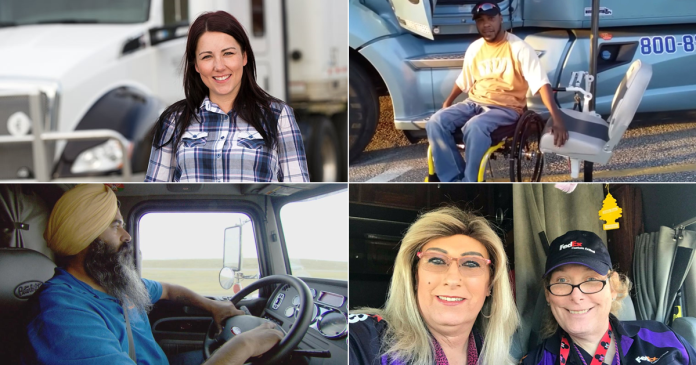The trucking industry is under scrutiny as concerns about inclusivity have sparked heated discussions, particularly on Truck Stop Québec’s Facebook page. The reactions have been numerous and diverse, ranging from personal testimonials to passionate debates.
Many truck drivers, both men and women, have pointed out that the trucking industry is far from being a model of inclusion. One subscriber noted that as long as derogatory terms continue to be used, progress will be difficult, highlighting the outdated attitudes that still linger in the field. The use of such terms demands constant vigilance from page administrators to moderate discussions and ensure respect. It’s clear that many struggle to distinguish between expressing an opinion, whether popular or not, and deliberately denigrating others.
Experiences of sexism and discrimination were shared by some participants. A female truck driver recounted how clients often overlook her presence, addressing her male colleague instead, despite her skills and professionalism. Some women in the industry believe that the U.S. transportation sector is more open and welcoming to women.
Others in the discussion took a more defensive stance, claiming that the trucking industry is inclusive as long as competence is evident. One driver argued that regardless of gender or sexual orientation, what matters is professional performance. “Can you drive a truck?” If the answer is yes, then, according to these individuals, that person belongs in the industry, and that’s what truly matters.
However, this view has been criticized, with some arguing that even though companies advocate for inclusion, the individual attitudes of some truckers can still pose a barrier. One subscriber explained that while trucking might appear welcoming on the surface, the daily reality can be very different for minorities.
An autistic female truck driver shared the challenges she faces, such as long working hours and the lack of accommodations for those with special needs. The case of Simon, a paraplegic truck driver, highlights the difficulties encountered despite the goodwill expressed by companies. Although qualified and motivated, opportunities remain scarce.
Foreign truck drivers face increasing difficulties. Often perceived negatively due to the issuance of Class 1 licenses without adequate training and because of cultural differences, they face prejudices that further complicate their integration and acceptance in the industry.
In summary, despite several relevant testimonials, the mere mention of the term “diversity” has triggered strong reactions, revealing a deep-seated frustration among some. The debate, which should have focused on the initial question, quickly shifted to attack inclusivity itself. This discussion, which now extends beyond the trucking industry, reflects a broader societal unease. Extremes and “woke” culture seem to have pushed the issue of inclusivity and diversity to a point where discussions become impossible, with everything perceived as a form of propaganda. In this polarized context, those who try to approach these issues with a balanced perspective often find themselves pushed towards an extreme, simply because they don’t fully adhere to one position or the other.
In light of this reality, it seems the trucking industry must continue to reflect and adapt to fully integrate each individual. The goal is to create an environment where everyone feels respected, allowing for full and meaningful contributions from all, without marginalizing those who are already part of the community.
The future of trucking rests on recognizing the skills and professionalism of each person, beyond differences. It’s about opening the door to those who wish to contribute positively and effectively to the road transport sector while respecting and honoring the legacy of the current truckers.
Read more :
















